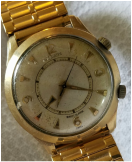weekly column
|
Each week, find a commentary on something connected to verses of Torah or another source of wisdom
|
|
Each week, find a commentary on something connected to verses of Torah or another source of wisdom
|
 If you know this story, I apologize for retelling it. I tell it to myself all the time. Not quite a month after my father died, I went on a trip to Poland with a group of rabbis. The trip left out of Chicago, so I came in a couple of days before and, at my mother’s request, my brother and sister and I went through his clothes and belongings to choose what we wanted to remember him by. The evening we spent was crazy and hilarious and heart-breaking. We tried on suits and hats, remembered Dad wearing particular shirts (remember Qiana?) and made piles of his quality clothing to benefit men who could never afford them. We examined his collection of broken electric shavers. We read the letters we wrote to him as kids. And at the end of exhausting hours, the three of us sat on the edge of our parents’ bed and looked at what was left, lined up on the top of his chest of drawers. There were six watches. Dad had two older wind-up watches, two modern everyday electric watches (one analog, one digital) and two jewelry-quality watches that were his late life indulgences. Nobody wanted to pick first, but we collectively decided that my sister had first dibs, then my brother, and finally me. Everyone got what they wanted, as it happened. I wanted the old wind-up watches, especially the one that had a mechanical alarm that vibrated against his wrist when it went off. There was a reason for it. He wore that watch every day when I was a little boy. When he came home from work and reached out for me, it is what I would see. When I saw that watch, daddy was home. I used to try that watch on all the time. When I was little, it slid above my elbow. When I got to be a teenager, I was scrawny enough that it flopped around on my forearm. It never fit. The whole story resonates for me in a particular way when I read about the death of Aaron (Numbers 20:23-29). Lots of people die in the Bible in lots of different ways. Miriam seems just to have stopped living a few short verses before. And before that plague, fire and earthquake took care of the rebels against Moses. But Aaron’s impending death is announced and orchestrated. The uniform he wears as High Priest, the sign of the office he holds, is to be passed along to his successor, Eleazar. At God’s instruction, Aaron, Moses and Eleazar climb to the top of a mountain. Moses strips the garments from his older brother and dresses Eleazar in them. Aaron lies down and dies. What kind of moment was that? This family had known public triumph and private tragedy, but their private tragedies – the death of two of Eleazar’s brothers, the loss of Miriam, the challenges to leadership – were all played out publicly. And now, Eleazar stands by as Moses removes his father’s tokens of office – and life – and bestows them on him. Over the course of my years of teaching this section of Torah, I have asked people to imagine the scene. Sometimes, using the technique of Bibliodrama developed by my extraordinary friend Peter Pitzele, I have asked them even to be Moses, Aaron or Eleazar. From elementary school students to older adults, the richness of the story produces heartbreak, a rush of love, disbelief and, so often from “Aaron,” pride and satisfaction. As my siblings and I slipped in and out of our father’s various uniforms – his army boots, his exercise outfits, his business suits, his leisure wear – we inhabited him for a moment. Maybe we realized that even without his clothes we inhabited him as well. I went off to Poland the next day and my mother packed up what I had chosen and sent it off to me in Virginia. It arrived just as I returned home from the trip. I unpacked the boxes and hung up the suits, found a place for his cufflinks and collar stays of every size, wondered if I would ever dare to wear a Qiana shirt. And there was the watch. I tried it on. And it fit. To this day, I can’t think of that moment without feeling the disorientation that overwhelmed me. Not quite a month after the inevitable end of his complicated health issues, I experienced his loss all over again. That watch was not supposed to fit me. I was never supposed to grow into it. I am certain that Eleazar felt the same way. The text makes no mention of it, and for sure there was no watch for him to wear – perhaps it was a mitre, a breastplate, a tunic. Maybe it was just the scent of the smoke from the sacrifices that he smelled reaching for him rather than emanating from him. But the time had come for him to wear his father’s clothes. Look around you these days and you will wonder where you will find the outsized figures of a generation past. The people who pursue leadership and high office seem to fall short in so many ways, and the mitre or the mantel looks more like parody than promise. Then go look in that box of things you inherited and try them on. Guess what? They fit.
0 Comments
Leave a Reply. |
Archives
October 2023
Categories |